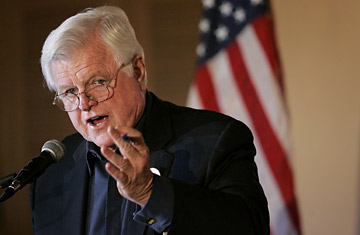
Massachussetts Senator Ted Kennedy
The rap on today's political conventions is that they lack real drama — they're all stagecraft and set pieces. But one tough old Democrat is trying to change that. Senator Edward M. Kennedy, beset with brain cancer and defying his doctors, arrived here today with hopes of addressing the convention tonight in a scene ready-made for Hollywood.
Kennedy's Senate office confirmed that the liberal legend is in Denver to attend a tribute to his near half-century of service to the Democratic Party. He will be joined in the Pepsi Center convention hall by other members of the party's first family: his sister Jean Kennedy Smith; sister-in-law Ethel Kennedy, the widow of slain New York Senator Robert F. Kennedy; and a number of nieces and nephews, including Caroline Kennedy Schlossberg, whose father John F. Kennedy was nominated at the party's convention in Los Angeles in 1960.
The question is whether the Senator will take the stage and address the crowd. One source close to the Kennedy family says his wife Victoria Reggie Kennedy is fearful that a speech might endanger his health. "It's not just the doctors, it's his wife," the source told TIME.
Kennedy's office in Washington tried to dampen expectations this afternoon. "Senator Kennedy is in Denver. ... Right now, he plans to attend, not speak" during tonight's tribute to him, Kennedy spokesman Anthony Coley said in an e-mail. "He's truly humbled by the outpouring of support, and wouldn't miss it for anything in the world."
A Kennedy speech would wrap almost the entire modern history of Democratic politics into a single poignant moment. No one is better at rallying the hopes of liberals in dark moments. Both his eulogy 40 years ago for his brother Robert and his concession address at the 1980 convention are ranked among the 100 greatest American speeches of the 20th century by AmericanRhetoric.com. A fair number of ardent Democrats can recite from memory his closing words in the 1980 speech:
"For me, a few hours ago, this campaign came to an end," he declared in a trumpet voice that has always sounded like a throwback to politics before the invention of loudspeakers. "For all those whose cares have been our concern, the work goes on, the cause endures, the hope still lives, and the dream shall never die!"
His long career — a Senator since 1962, author of landmark legislation and the great never-was President of his generation — has been an intersection of the party's brightest days and some of its greatest debacles. His failed 1980 challenge to incumbent Democratic President Jimmy Carter inflamed divisions in the party that have never entirely healed. In fact, when Kennedy gave an early and thunderous endorsement for Barack Obama earlier this year, he reopened some of those wounds — at least, in the view of some Hillary Clinton supporters.
Shortly after that, Kennedy suffered a seizure in May and his brain cancer was discovered. In June, he underwent surgery to remove parts of the highly malignant tumor, and he has been undergoing chemotherapy since then. In July, he returned to the Senate to help break a Republican filibuster and received a standing ovation from colleagues in both parties. But a source close to the Senator says that public appearance took a much greater toll on Kennedy than he let on while the cameras were rolling.
One effect of the chemotherapy treatments is to suppress the immune system, which is why Kennedy's doctors and his wife were reluctant to approve a trip to Denver that might expose him to the germs of some 15,000 spectators crammed into the arena and cheering at the top of their lungs. In recent weeks, Victoria Kennedy had told friends it couldn't happen, citing the risk of infection. The Senator reportedly overruled those concerns on Sunday.
Perhaps the most he can manage is a smile and a wave. But of all the personas that have been attached to Kennedy over the decades — the reluctant prince, the libertine and, finally, the éminence grise — the one that seems closest to his own heart is the fighter. If Ted Kennedy can find the strength to go once more into the breach, to rally the troops and send them roaring into battle, he will.
